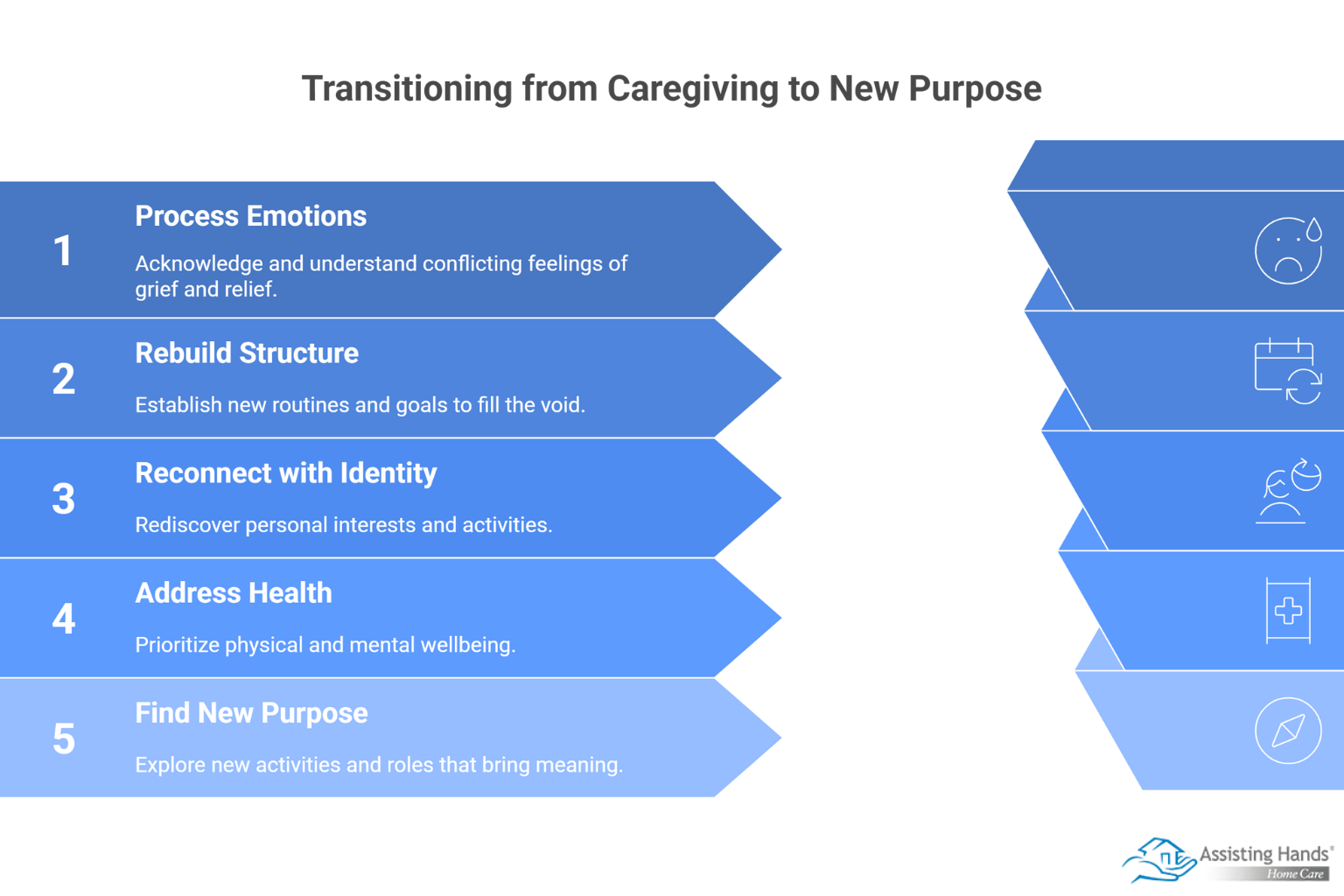
Table of Content
The end of a caregiving journey brings a complex mix of grief, relief, and uncertainty that few people prepare for. After months or years of focusing entirely on someone else’s needs, caregivers suddenly face empty schedules and must rebuild their identities beyond their caregiving roles.
Processing Grief and Relief Simultaneously
Many caregivers experience conflicting emotions when their responsibilities end. Grief over losing a senior loved one often mingles with relief that the loved one’s suffering has ended and that the demanding caregiving routine is over. This combination can trigger guilt, as caregivers worry feeling relieved somehow diminishes their love or dedication.
These mixed emotions are completely normal and healthy. Acknowledging both feelings allows for more authentic healing. Grief counselors often remind caregivers that relief doesn’t negate love—it simply reflects the reality that caregiving, while meaningful, can be physically and emotionally exhausting.
Consider joining a grief support group specifically for former caregivers. These groups understand the unique challenges of losing both a loved one and a primary life purpose simultaneously.
A professional caregiver can also be a fantastic resource for you and your whole family. Seniors can face a variety of age-related challenges. Though some families choose to take on the caregiving duties, there may come a time when they need a trusted in-home care provider. Families sometimes need respite from their duties so they can focus on their other responsibilities, and some seniors need around-the-clock assistance that their families are not able to provide. Assisting Hands Home Care is here to help.

Rebuilding Your Daily Structure
Caregiving creates rigid routines built around another person’s needs. When those responsibilities disappear, the sudden lack of structure can feel disorienting. Many former caregivers describe feeling lost without the constant demands that previously organized their days.
Start rebuilding structure gradually:
- Begin with small consistent activities like morning walks or regular meals.
- Set gentle goals that provide purpose without overwhelming pressure.
- Maintain some routines from your caregiving days if they bring comfort.
- Create new rituals that honor your loved one’s memory while moving forward.
Avoid making major life decisions immediately after caregiving ends. Your sense of identity and priorities may shift significantly as you adjust to this transition.
Reconnecting with Your Own Identity
Extended caregiving often requires setting aside personal interests, career goals, and social connections. Former caregivers frequently have difficulty remembering who they were before this role consumed their lives.
Rediscovering your identity takes patience and experimentation. Start by reflecting on interests and activities you enjoyed before caregiving began. Consider what aspects of caregiving brought you satisfaction—perhaps helping others, problem-solving, or providing comfort—and explore how to incorporate these elements into new pursuits.
Some caregivers find meaning in volunteer work that uses skills they developed during their caregiving experiences. Others pursue education, career changes, or creative endeavors they postponed. The key is allowing yourself time to explore without pressure to immediately find your “new normal.”
Addressing Physical and Emotional Health
Caregiving takes a significant toll on physical and mental health. Research shows that caregivers often neglect their own medical needs and experience higher rates of depression, anxiety, and chronic health conditions. The transition period offers an opportunity to prioritize your wellbeing.
Schedule comprehensive medical and dental checkups to address any health issues you may have postponed. Consider working with a therapist who specializes in caregiver transitions, as they understand the unique challenges you’re facing.
Pay attention to these common post-caregiving challenges:
- Sleep disruption from years of interrupted rest
- Social isolation after focusing solely on caregiving duties
- Financial stress from reduced income or caregiving expenses
- Physical symptoms from chronic stress and exhaustion
Family caregivers need to care for their own wellbeing. If you’re caring for an aging loved one and are feeling overwhelmed, consider hiring a professional caregiver to provide respite care. Potomac families who want to prevent burnout can turn to Assisting Hands Home Care. One of our professional caregivers can assist your loved one at home while you take a nap, go to work, run errands, or go on vacation.
Finding New Purpose and Meaning
Many former caregivers experience a sense of purposelessness after their caregiving roles end. The intense meaning and importance of caring for a loved one can make other activities feel trivial by comparison.
Finding a new purpose doesn’t require immediately replacing caregiving with something equally intense. Meaning can come from small acts of service, creative expression, strengthening relationships, or personal growth. Some caregivers become advocates for others facing similar challenges, while others focus on experiences they missed during their caregiving years.
Consider your loved one’s values and interests as you explore new directions. Many caregivers find comfort in pursuing activities their loved ones would have supported or causes they cared about.
Remember this transition is a process, not a destination. Allow yourself grace as you navigate the complex emotions and practical challenges of rebuilding life after caregiving ends.
One of the most challenging tasks of helping an elderly relative age in place safely and comfortably is researching agencies that provide elder care. Potomac families can turn to Assisting Hands Home Care for reliable, high-quality in-home care for aging adults. We offer 24-hour care for seniors who require extensive assistance, and we also offer respite care for family caregivers who need a break from their caregiving duties. To create a customized home care plan for your loved one, call Assisting Hands Home Care today.








